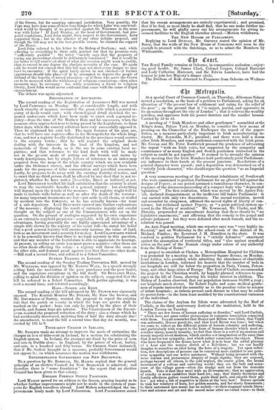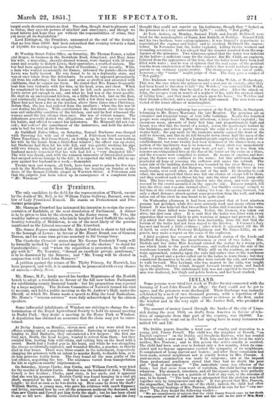C4t gttrupplu.
At a special Court of Common Council, on Thursday, Alderman Sidney moved a resolution, as the basis of a petition to Parliament, asking for an alteration of "the present law of settlement and rating for the relief of the poor" ; on the ground that it "is unjust, partial, and oppressive in its operation throughout the city of London " ; that it relieves the wealthy parishes, and oppresses both the poorer districts and the smaller houses. Carried by 55 to 42.
A meeting of "Irish Members and other gentlemen" assembled at the King's Arms, Palace Yard, on Monday, to consider the best means of pressing on the Chancellor of the Exchequer the repeal of the paper- duties, as a measure particularly important to Irish manufacturing in- dustry. Mr. Reynolds, M.P., presided; and there were half a dozen other Irish Members, and some gentlemen connected with the Irish prem. Mr. Cowan and Mr. Peter Borthwick pressed the prudence of advocating the repeal "with an Irish voice, but supported by the sympathy and countenance of as many English and Scotch gentlemen interested in the subject as could be got together." It seemed to be strongly the opinion of the meeting that the Irish Members hold particularlygreat Parliament- ary influence in their hands at the present juncture. Resolutions of a general character were passed ; and a deputation was determined on of a "strictly Irish character," who shouldargue the question "as an Imperial question."
A very numerous meeting of the Protestant inhabitants of Southwark who were summoned to petition Parliament for an epetual bill against the designs of Popery, at one period assumed a tumultuous character, in con- sequence of the strenuous proceeding of a compact body who "deprecated legislation." The first resolution, which was moved by Mr. Apsky Pel- 'aft, declared disappointment at the inefficient bill before Parliament : it was carried with only two dissentients. The second resolution, moved and seconded- by clergymen, affirmed the sacred rights of liberty of con- science, but reclaimed against Popery, as "a great political system op- 1' posed to the liberty of mankind." Mr. Townsend, Mr. Clarke, and Mr. fhwaits, propounded an amendment desiring that there should be "no legislative enactments," and affirming that the remedy is the gospel and private judgment : but they were defeated after much tumult, and the re- solution was passed.
An Anti-Papal meeting, which one reporter says was "very highly in- fluential," met on Wednesday in the school-room of the district of St. Michael, Pimlico; the Reverend J. H. Hamilton in the chair. It Was resolved to petition Parliament for a "strictly defensive" enactment igainst the assumption of territorial titles, and also against synodical action on the part of the Romish clergy under colour of any authority from the Bishop of Rome."
A project to establish at Chelsea a Metropolitan Hospital for Children was promoted by a meeting in the Hanover Square Rooms, on Monday. Lord Ashley, who presided, while admitting the abundance of charitable institutions in London, informed his hearers that the number of beds in our hospitals are still far below the proportion in Paris, Vienna, Peters- burg, and other large cities of Europe. The Earl of Carlisle recommended the project to the Christian world, by happily-phrased reference to pas- sages in the life of Jesus, showing his tender interest in children. The Bishop of London observed, that our population increases 30,000 a year ; our hospitals much slower. Sir Robert Inglis and some medical gentle- men of repute instructed the assembly as to the peculiar value to science of infant hospitals ; as infants present each disease in what may be called its purest form—in the form least modified by the constitutional variances of the individual.
The claims of the Asylum for Idiots were advocated by the Earl of Carlisle, at the third anniversary festival of the institution, held in the London Tavern on Tuesday.
" There are few forms of human suffering or disorder," said Lord Carlisle, "which have not some rather picturesque or romantic association connected with them. You all remember that Homer and Milton were blind, that Virgil was asthmatic, Horace paralytic, and that Lord Byron was lame ; but when we come to reflect on the different points of human calamity and suffering, and particularly with respect to the form of human disorder which most re- , sembles idiocy, namely insanity, we feel that there is a sort of mysterious and moody majesty about madness, which excites our imagination at the same time that it moves our sympathy, and which rather consecrates the object. Those who have frequented the drama know what it is to hear the awful phrensy rf a Lear and the maniac shriek of a Belvidere; but we can hardly imagine to ourselves -an idiot being the hero of a tragedy. Yet upon reflec- tion, few descriptions of persons can be conceived more entitled to our gene- rous sympathy and our active assistance. Without being invested with the more solemn and picturesque drapery of tragic dignity, they are exposed, perhaps beyond all others, to the cold neglect, the coarse gibes, the brutal merriment of a callous and unfeeling world ; they are the butt and scare- crow of the village green—often the drudge sent out from the domestic hearth. Take it that they meet with no fll-treatment ; that no aggravation of cruelty or scorn embitters their hard lot ; nay, that family decencies and family affections gather round them, guide their path, and smooth their pil- low: yet what a life of negatives is theirs at the very best ! Nature spreads in vain her witchery of hues, her golden sunsets, and her starry firmaments ; to their untutored ears mum has no melody—to their stagnant minds litera- ture and science and art and the sacred muse utter no varied voice—to their turgid souls devotion points no God. Too often, though dead to pleasure and to virtue, they exercise powers of mischief and annoyance; and though we mud believe and hope they are without the responsibilities of crime, they yet incur all its degradation."
Lord Ebrington, the President, announced at the end of the festival, that no less than 2500/. had been subscribed that evening towards a fund of 10,000/. for rearing a spacious Asylum.
At Worship Street Police Office, on Saturday, Mr. Thomas Eames, a tailor and draper, in business in the Downham Road, KingsLand, and Mary Anne his wife, a masculine, showily-dressed woman, were charged with ill-treat- ment and cruelty to Robert Lewis, their apprentice, a youth of sixteen. The boy had been apprenticed by the Board of Guardians ; very recently, Wills, a man who worked occasionally for Eames, informed the parish-officers that Lewis was badly treated. He was found to be in a deplorable state, and was at once taken from the defendants. In court, he appeared prematurely old from his sufferings; his hands and arms so swollen and ulcerated with chilblains, that he cannot use them. He stated that Mrs. Eames frequently beat him very violently with her fists, on his head, arms, and chest. When he complained to his master, Eames said he left such matters to his wife. Lewis never got enough to eat, and what he had was of the worst quality. He slept in an underground kitchen, on a filthy flock-bed, laid on the floor, and continually damp from its situation, with a few dirty rags to cover him. There had not been a fire in the kitchen above three times since Christmas. Before that, the boy had suffered from the smallpox ; when the fire was lit once during his illness. Wills corroborated the statement about the damp- ness and unhealthy condition of the kitchen, and said he had witnessed the woman assail the boy oftener than once. She was of violent temper. The defendants generally denied the allegations, said the boy was very dirty in his habits, and offered to cancel his indentures. Mr. Hammill did not con- cede, but ordered the cancelment of the indentures, and held the defend- ants to bail for trial at the Sessions.
At Guildhall Police Office, on Saturday, Samuel Duchesne was charged with throwing his wife out of window. A Policeman heard screams in Three Tons Court, Red Cross Street ; on looking up, he saw the man holding his wife by the hands from a third-floor window ; the officer ran up-stairs, but Duchesne had then let his wife fall, and was quietly smoking his pipe with two friends, who had not at all interfered to save the woman. The husband merely remarked that his wife had led a "very dissipated life." The wife was drunk, and, with the common immunity of intoxicated persons had escaped serious damage by the full; it is expected she will be able to ap- pear against her husband in a week.—Remanded.
Twenty men and women, all Irish, have been sent to prison for five days each by the Marlborough Street Magistrate, for begging on Sunday at the doors of the Roman Catholic chapel in Warwick Street. A Policeman said that the culprits had been taken up in consequence of a complaint from "Mr. Wiseman."



























 Previous page
Previous page